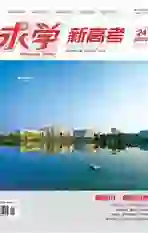置身大自然会对你体验时间的方式产生深远影响
2024-02-19黄连英
Do you ever get that feeling that there aren’t enough hours in the day? That time is somehow racing away from you, and it is impossible to fit everything in. But then, you step outside into the countryside and suddenly everything seems slower, more relaxed, like time has somehow changed.
Recent research suggests that the antidote to our lack of time may lie in the natural world. Psychologist Richardo Correia, at the University of Turku in Finland, found that being in nature may change how we experience time and, perhaps, even give us the sense of time abundance.
Correia examined research which compared people’s experiences of time when they performed different types of tasks in urban and natural environments. These studies consistently showed that people report a sense of expanded time when they were in nature compared to when they were in an urban environment.
For example, people are more likely to perceive a walk in the countryside as longer than a walk of the same length in the city. Similarly, people report perceiving time as passing more slowly while performing tasks in natural green environments than in urban environments. Nature seems to slow and expand our sense of time.
It’s not just our sense of time in the moment which appears to be altered by the natural world, it’s also our sense of the past and future. Previous research shows that spending time in nature helps to shift our focus from the immediate moment towards our future needs. So rather than focusing on the stress of the demands on our time, nature helps us to see the bigger picture.
This can help us to prioritise our actions so that we meet our long-term goals rather than living in a perpetual state of “just about keeping our head above water”.
This is in part because spending time in nature appears to make us less impulsive, enabling us to delay instant gratification in favour of long-term rewards.
(材料选自ChinaDaily网站,有删改)
1.What’s the function of the first paragraph?
A. To lead in the topic of the passage.
B. To tell us the author’s opinion.
C. To give background information.
D. To stress the importance of time.
2.What does the underlined word “antidote” in the second paragraph mean?
A. Adjustment." " " " " " " " B. Solution.
C. Damage." " " " " " " " " " "D. Application.
3.How did Correia get his finding?
A. By making some comparisons.
B. By investigating different people.
C. By analyzing previous researches.
D. By doing some experiments.
4.Which of the following isn’t the benefit of nature?
A. Nature can slow our sense of time.
B. Nature can help us focus on future needs.
C. Nature can delay our instant gratification.
D. Nature can enable us to live in the moment.
1.A。解析:推理判断题。材料第一段提到“你是否有过这样的感觉:一天的时间不够用,时间不知不觉地从你身边溜走,不可能把所有事情都安排好。但是,当你走到郊外,突然间一切都变得缓慢、轻松起来,就好像时间发生了某种变化”。由此可知,材料第一段的作用是引出文章的话题——大自然可以调节我们的时间感。A选项与材料内容相符,故选A。
2.B。解析:词义猜测题。材料第二段的第二句提到“身处在大自然中可能会改变我们对时间的体验方式,甚至可能让我们感觉到时间充裕”,那么材料第二段的第一句的句意应为“最新研究表明,解决我们的时间匮乏问题的办法可能在于自然世界”。由此可知,画线词“antidote”的意思应有“解决办法”之意,与B选项“Solution”的意思相似,故选B。
3.C。解析:推理判断题。材料第三段的第一句提到“科雷亚查阅了比较人们在城市和自然环境中执行不同类型的任务时对时间的体验方式的研究”。由此可知,科雷亚是通过分析以前的研究获得调查结果的。C选项与材料内容相符,故选C。
4.D。解析:细节理解题。材料第四段的最后一句提到“Nature seems to slow and expand our sense of time.”,由此可以排除A选项。材料第五段的第二句提到“…to shift our focus from the immediate moment towards our future needs.”,由此可以排除B选项。材料最后一段提到“…enabling us to delay instant gratification in favour of long-term rewards”,由此可以排除C选项。材料倒数第二段提到“…rather than living in a perpetual state of ‘just about keeping our head above water’.”,由此可知,我们不应该永远生活在“只求过得去”的状态中,D选项的意思与之相反,故选D。
